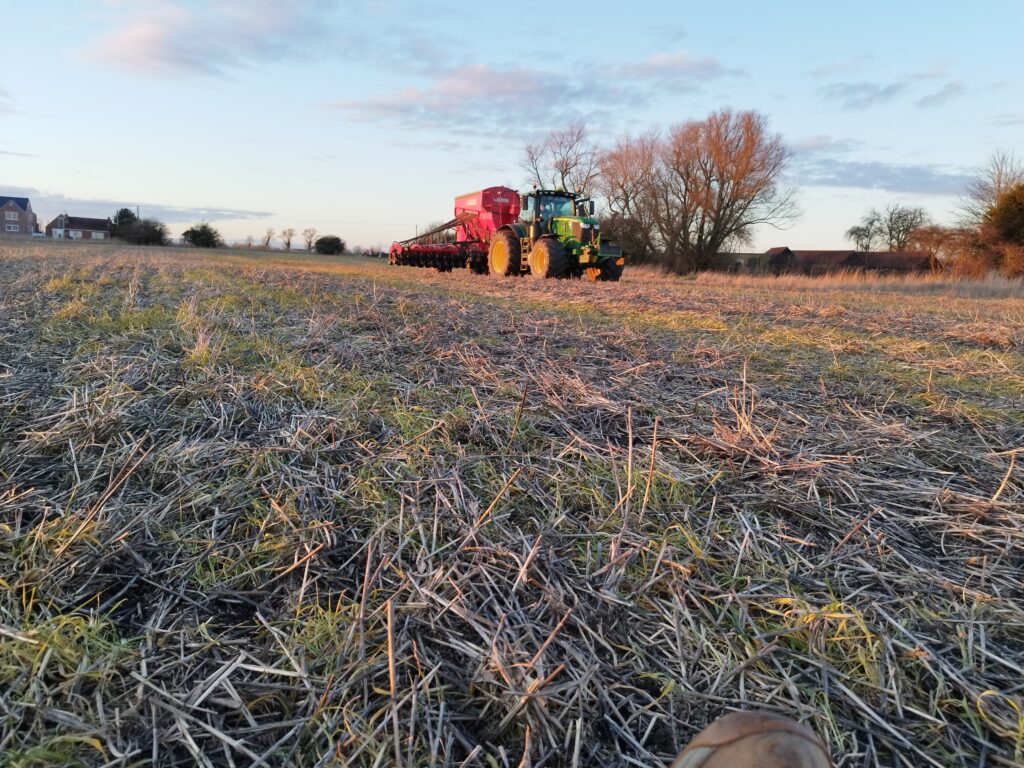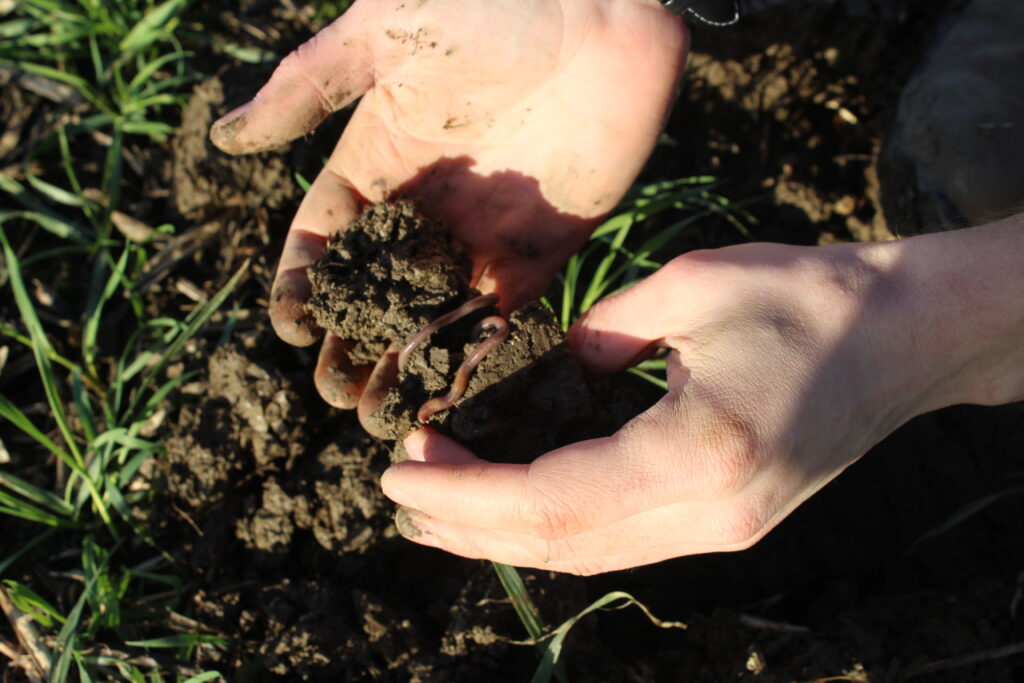Written by Thomas Gent, UK Market Lead for Agreena
As part of a British farming family which has worked the land for generations, we have witnessed firsthand the shifts in weather patterns and the challenges they pose to our farming practices.
The threat of climate change is no longer a distant concern; it’s an immediate and pressing reality that demands our attention and action. There is no question that our soils are one of the largest carbon sinks on the planet but their degradation due to heavy tillage, the use of fertilisers, etc., has led to ever increasing poor soil health and increased carbon emissions, both of which have a huge impact on British agriculture.
The Changing Climate Landscape
The British weather has always been a topic of conversation, but in recent years, the conversations have shifted from mere small talk to serious discussions around unprecedented weather events.
Erratic rainfall patterns, intense heat waves, and unseasonal frosts have become our new normal.
As farmers, we are acutely aware of how these changes affect our crops, livestock, and crucially, our livelihoods. The increasing unpredictability of the weather makes planning and decision-making incredibly challenging, and has brought to our attention the need for more climate friendly and resilient farming practices.
Soil Health: The Unsung Hero
One of the most miscalculated aspects of the impact of climate change on British agriculture is soil health. Our soil is the foundation upon which our farms thrive, providing the nutrients necessary for healthy crops and pastures.
The changing climate disrupts the delicate balance between healthy soil and unhealthy soil.
Increased rainfall leads to soil erosion and nutrient runoff, while prolonged droughts compact the soil and hinder root growth. As a result, our soil suffers, soon becomes unhealthy, less fertile, and as a consequence we face reduced yields and diminished quality of our produce.
Investing in soil health is imperative to enable farmers to successfully adapt to changing weather conditions. This investment should also form part of a strategy for farmers to help mitigate climate change itself.
Healthy soil acts as a carbon sink, capturing and storing carbon dioxide from the atmosphere. The sequestration of carbon is a key element of environmentally friendly farming and has a key role to play in mitigating climate change.

Carbon Sequestration: A Vital Solution
Carbon sequestration is the process by which carbon dioxide is removed from the atmosphere and stored in natural sinks, such as soil and trees. This process not only reduces greenhouse gas levels in the atmosphere but, the more carbon there is in the soil increases the fertility and the greater the enhancement to the overall ecosystem.
It is easy to see that carbon sequestration is an invaluable tool in the fight against climate change whilst simultaneously bolstering the resilience of our agricultural systems by helping to keep our soil in good health.
One of the most effective ways to increase carbon sequestration is through regenerative agricultural practices. These practices involve minimising soil disturbance by moving from ploughing to min-till or no-till, planting cover crops, and broadening crop rotation. By avoiding intensive tillage, carbon is prevented from being released into the atmosphere. Instead, it remains in the soil, contributing to its structure and nutrient content and general health.
An important benefit of this regenerative approach being taken by British farmers is the potential to be rewarded for their climate-friendly efforts through carbon certificates. The issue of these certificates is based on the verified quantity of carbon sequestered in the soil as a result of improved farming practices.
Carbon certificates are a valuable financial asset to be traded within the voluntary carbon market, and are representative of a shift in how farmers and land managers will increasingly be perceived.
Realisation is beginning to dawn that although farming will always be about producing the food we all need to live, farmers are now dynamic participants in the global carbon cycle as they make the transition to regenerative farming driving carbon sequestration, resulting in the issue of carbon certificates that will be sold to organisations who want to offset their carbon emissions.
In addition to fostering environmental resilience through regenerative agriculture, the additional revenue from the sale of carbon certificates delivers a valuable new revenue stream for farmers. A revenue stream which can partly help to replace traditional subsidy programmes like the Basic Payment Scheme (BPS).
Aligning potential new revenue streams available from carbon trading, with sustainable land management and regenerative farming, will not only bolster the fight against climate change but also reinforce the economic viability of farming practices that prioritise the health of our planet’s most fundamental resource – its soil.

The Need for Support and Education
Adopting and changing to regenerative farming practices, and making a priority of soil health is not without its challenges.
Many farmers are hesitant to adopt new methods. Few people like change and for farmers transitioning to more regenerative farming practices means they have to change the way they have been farming for years! There are also real concerns around the initial costs and uncertainties surrounding the outcomes of such change.
It’s here that policymakers and agricultural institutions have a critical role to play. Financial incentives, grants, and access to expert guidance can empower farmers to make the necessary changes.
Furthermore, public awareness campaigns can help consumers understand the importance of supporting sustainable agricultural practices, encouraging a demand for responsibly produced food.
Education is also key. Farmers need access to the latest research, best practices, and to learn of success stories from their peers. Workshops, seminars, and online resources can provide a platform for knowledge exchange and collaboration.
As I kept hearing at this year’s Groundswell, discussing and learning from the experience of other farmers can make the transition to regenerative agriculture feel less daunting and more achievable.

The Way Forward
While climate change poses unprecedented challenges to British agriculture, farmers are beginning to understand that it also presents an opportunity to re-evaluate how they farm to lessen the impact of unpredictable weather patterns. They also see that there are environmental and financial benefits to be achieved by making positive changes.
The latest report from the Intergovernmental Panel on Climate Change (IPCC) emphasises the significance of sustainable agriculture as a potent tool in combating carbon emissions.
This is evidence of the change in how farming/agriculture is now being viewed. Awareness is growing as to the important role that responsible, climate friendly land management can play in reducing the impact of climate change. Farmers now offer climate mitigation services.
In future, to ensure this momentum and the awareness of change continues, we farmers should also view ourselves in a new light.
Despite the seemingly endless challenges we face, such as reduced BPS, higher input costs, high energy costs, etc., to just scratch the surface, we should recognise and promote our powerful position when it comes to mitigating climate change.
As custodians of the land and the precious soil beneath it, we should be looking to practise sustainable, regenerative farming which will put us firmly on the road to carbon sequestration so that carbon farming becomes the norm.
Conclusion
As farmers, we hold a unique position to help overcome the challenge of climate change. Our connection to the land gives us unprecedented insight into its needs and vulnerabilities. By embracing regenerative agriculture, we can build resilient ecosystems that are better equipped to handle extreme weather events while contributing to a healthier planet.
By championing sustainable practices and advocating for supportive government policies, farmers can be leaders in the effort to mitigate the impact of climate change on British agriculture.
The time for underestimating the future challenges of climate change is over. Now is the time to harness our knowledge and passion for farming, to drive regenerative farming practices that work alongside the environment and with nature, to ensure a sustainable future for generations to come.




